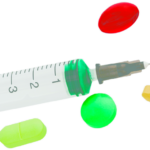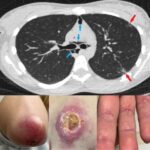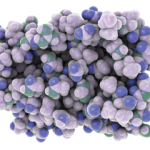The FDA has approved the first interchangeable biosimilars for denosumab.

Subcategories:Axial SpondyloarthritisGout and Crystalline ArthritisGuidelinesMyositisOsteoarthritis and Bone DisordersOther Rheumatic ConditionsPain SyndromesPediatric ConditionsPsoriatic ArthritisRheumatoid ArthritisSjögren’s DiseaseSoft Tissue PainSystemic Lupus ErythematosusSystemic SclerosisVasculitis

The FDA has approved the first interchangeable biosimilars for denosumab.

In a phase 3 trial, treatment with VX-548 led to statistically and clinically significant improvements in pain compared with placebo.

David Mecham, DO |
For the 2023 Image Competition, the ACR sought images representing a diverse range of patients with idiopathic inflammatory myopathies (IIMs) or IIM mimics. Pneumomediastinum & Ulcerative Cutaneous Dermatomyositis These images depict a 22-year-old woman with a recent diagnosis of anti-melanoma differentiation-associated gene 5 (MDA-5) antibody dermatomyositis who sought evaluation of worsening skin rashes and pleuritic…

Ryan Basen |
About 30 years ago, early in his career as a rheumatologist, Dirkjan van Schaardenburg, PhD, says patients with osteoarthritis experienced terrible problems with inflammation. The landscape has improved to the point that “people can live with it now,” he says. But they still need help. For example, osteoarthritis affects 7% of the global population, according…

Devyani Misra, MD, MS, & Jiha Lee, MD, MHS |
SAN DIEGO—Older adults with rheumatoid arthritis (RA) comprise two groups: those who have lived with diagnosed RA since an early age (young-onset RA) and those who have new-onset RA diagnosed at an older age (≥65 years), known as late-onset RA or, formerly, as elderly onset RA.1 Individuals with late-onset RA have more acute and systemic…

Geoffrey E. Thiele, MD, & Iris Reyhan, MD |
Pachydermoperiostosis (PDP), also known as Touraine-Solente-Golé syndrome or primary hypertrophic osteoarthropathy, is a rare syndrome that can be inherited as autosomal dominant, autosomal recessive, or sporadically. This progressive disease primarily affects males, who tend to have more severe features than females. PDP usually occurs during adolescence, often starting around puberty.1 The main clinical features are…
Difficult-to-treat rheumatoid arthritis (RA) is defined as the failure of two or more classes of biologic or targeted synthetic disease-modifying anti-rheumatic drugs (DMARDs) to control active or progressive disease in patients with RA. Between 5 and 20% of patients with RA have difficult-to-treat RA.

Regaining a sense of control, limiting responsibilities and engaging in mindfulness can help rheumatologists manage their mental health needs. Rheumatologists should also address the mental health concerns raised by their patients. Here are insights from a psychiatrist/rheumatologist.

Katie Robinson |
Current knowledge of receptor-ligand interactions, cell signaling, and transcriptional regulation derive from studies of type I interferon. The design of novel therapeutics is informed by the advances in investigation of type I interferon, with the potential for important impacts on patient management.

Stephen J. Balevic, MD, PhD, RhMSUS |
Checking blood levels of commonly used disease-modifying anti-rheumatic drugs (DMARDs) has gained widespread attention in the rheumatology community, even resulting in a recent guidance document from EULAR for biologics.1 Although a highly useful tool, drug level measurement in rheumatology is not without challenges; many of our drugs violate the basic principles of pharmacology that we…